Fleurs du Mal Magazine


Or see the index
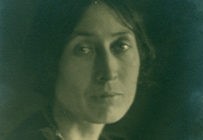
Thaw
Blow through me wind
As you blow through apple blossoms…
Scatter me in shining petals over the passers-by…
Joyously I reunite… sway and gather to myself…
Sedately I walk by the dancing feet of children—
Not knowing I too dance over the cobbled spring.
O, but they laugh back at me,
(Eyes like daisies smiling wide open),
And we both look askance at the snowed-in people
Thinking me one of them.
Lola Ridge
(1873-1941)
Thaw
• fleursdumal.nl magazine
More in: Archive Q-R, Archive Q-R, Ridge, Lola
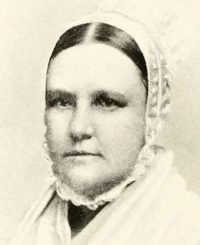
All Alone
Alas! they have left me all alone
By the receding tide;
But oh! the countless multitudes
Upon the other side!
The loved, the lost, the cherished ones,
Who dwelt with us awhile,
To scatter sunbeams on our path,
And make the desert smile.
The other side! how fair it is!
Its loveliness untold,
Its “every several gate a pearl,”
Its streets are paved with gold.
Its sun shall never more go down,
For there is no night there!
And oh! what heavenly melodies
Are floating through the air!
How sweet to join the ransomed ones
On the other side the flood,
And sing a song of praise to Him
Who washed us in His blood.
Ten thousand times ten thousand
Are hymning the new song!
O Father, join Thy weary child
To that triumphant throng!
But oh! I would be patient,
“My times are in Thy hand,”
“And glory, glory dwelleth
In Immanuel’s land.”
Eliza Paul Kirkbride Gurney
(1801 – 1888)
All Alone
• fleursdumal.nl magazine
More in: # Classic Poetry Archive, Archive G-H, Archive G-H
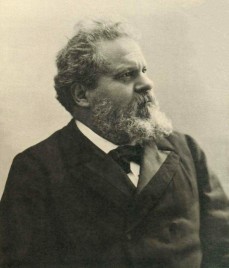
Madrigal
Breaking his way through the white clouds in the azure,
The sun laughs out and cries:
“O Springtime, come!”
Across the greening hills with placid murmurs
The streams sing back to the breeze:
“O Springtime, come!”
“O Springtime, come!” to his heart the poet is saying,
While gazing, O pure Lalage, in thine eyes!
Giosuè Carducci
(1835 – 1907)
Madrigal
• fleursdumal.nl magazine
More in: # Classic Poetry Archive, 4SEASONS#Spring, Archive C-D, Archive C-D

Spring Rain
I thought I had forgotten,
But it all came back again
To-night with the first spring thunder
In a rush of rain.
I remembered a darkened doorway
Where we stood while the storm swept by,
Thunder gripping the earth
And lightning scrawled on the sky.
The passing motor busses swayed,
For the street was a river of rain,
Lashed into little golden waves
In the lamp light’s stain.
With the wild spring rain and thunder
My heart was wild and gay;
Your eyes said more to me that night
Than your lips would ever say….
I thought I had forgotten,
But it all came back again
To-night with the first spring thunder
In a rush of rain.
Sara Teasdale
(1884-1933)
Spring Rain
• fleursdumal.nl magazine
More in: 4SEASONS#Spring, Archive Q-R, Archive S-T, Archive S-T, Teasdale, Sara
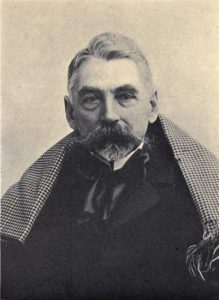
Si tu veux nous nous aimerons
Si tu veux nous nous aimerons
Avec tes lèvres sans le dire
Cette rose ne l’interromps
Qu’à verser un silence pire
Jamais de chants ne lancent prompts
Le scintillement du sourire
Si tu veux nous nous aimerons
Avec tes lèvres sans le dire
Muet muet entre les ronds
Sylphe dans la pourpre d’empire
Un baiser flambant se déchire
Jusqu’aux pointes des ailerons
Si tu veux nous nous aimerons.
Stéphane Mallarmé
(1842 – 1898)
Si tu veux nous nous aimerons
• fleursdumal.nl magazine
More in: Archive M-N, Archive M-N, Mallarmé, Stéphane, Mallarmé, Stéphane
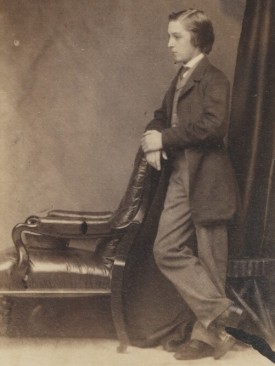
The child is father to the man
‘The child is father to the man.’
How can he be? The words are wild.
Suck any sense from that who can:
‘The child is father to the man.’
No; what the poet did write ran,
‘The man is father to the child.’
‘The child is father to the man!’
How can he be? The words are wild!
Gerard Manley Hopkins
(1844-1889)
‘The child is father to the man.’
• fleursdumal.nl magazine
More in: Archive G-H, Archive G-H, Hopkins, Gerard Manley
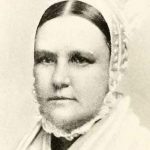
The Evening Star
Hail, pensile gem, that thus can softly gild
The starry coronal of quiet eve!
What frost-work fabrics man shall vainly build
Ere thou art doomed thy heavenly post to leave!
Bright star! thou seem’st to me a blest retreat,
The wearied pilgrim’s paradise of rest;
I love to think long-parted friends shall meet,
Blissful reunion! in thy tranquil breast.
I saw thee shine when life with me was young,
And fresh as fleet-winged time’s infantile hour,
When Hope her treacherous chaplet ’round me flung,
And daily twined a new-created flower.
I saw thee shine while yet the sacred smile
Of home and kindred round my path would play,
But Time, who loves our fairest joys to spoil,
Destined this hour of bloom to swift decay.
The buds, that then were wreathed around my heart,
Now breathe their hallowed sweetness there no more;
‘Twas thine to see them one by one depart,
And yet thou shinest brightly as before.
So, when this bosom, that ‘mid all its woes
Has longed thy little port of rest to win,
In the calm grave shall find at last repose,
Thou’lt beam as fair as though I ne’er had been.
Eliza Paul Kirkbride Gurney
(1801 – 1888)
The Evening Star
• fleursdumal.nl magazine
More in: # Classic Poetry Archive, Archive G-H, Archive G-H
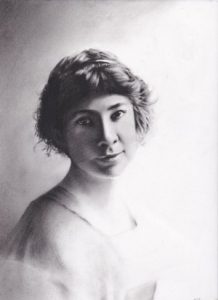
Spring Night
The park is filled with night and fog,
The veils are drawn about the world,
The drowsy lights along the paths
Are dim and pearled.
Gold and gleaming the empty streets,
Gold and gleaming the misty lake,
The mirrored lights like sunken swords,
Glimmer and shake.
Oh, is it not enough to be
Here with this beauty over me?
My throat should ache with praise, and I
Should kneel in joy beneath the sky.
O, beauty, are you not enough?
Why am I crying after love,
With youth, a singing voice, and eyes
To take earth’s wonder with surprise?
Why have I put off my pride,
Why am I unsatisfied,
I, for whom the pensive night
Binds her cloudy hair with light,
I, for whom all beauty burns
Like incense in a million urns?
O beauty, are you not enough?
Why am I crying after love?
Sara Teasdale
(1884-1933)
Spring Night
• fleursdumal.nl magazine
More in: 4SEASONS#Spring, Archive S-T, Archive S-T, Natural history, Teasdale, Sara

The Storm
I thought of you when I was wakened
By a wind that made me glad and afraid
Of the rushing, pouring sound of the sea
That the great trees made.
One thought in my mind went over and over
While the darkness shook and the leaves were thinned—
I thought it was you who had come to find me,
You were the wind.
Sara Teasdale
(1884-1933)
The Storm
from: Flame and Shadow
• fleursdumal.nl magazine
More in: #Editors Choice Archiv, Archive S-T, Archive S-T, Teasdale, Sara

Air and Angels
Twice or thrice had I lov’d thee,
Before I knew thy face or name;
So in a voice, so in a shapeless flame
Angels affect us oft, and worshipp’d be;
Still when, to where thou wert, I came,
Some lovely glorious nothing I did see.
But since my soul, whose child love is,
Takes limbs of flesh, and else could nothing do,
More subtle than the parent is
Love must not be, but take a body too;
And therefore what thou wert, and who,
I bid Love ask, and now
That it assume thy body, I allow,
And fix itself in thy lip, eye, and brow.
Whilst thus to ballast love I thought,
And so more steadily to have gone,
With wares which would sink admiration,
I saw I had love’s pinnace overfraught;
Ev’ry thy hair for love to work upon
Is much too much, some fitter must be sought;
For, nor in nothing, nor in things
Extreme, and scatt’ring bright, can love inhere;
Then, as an angel, face, and wings
Of air, not pure as it, yet pure, doth wear,
So thy love may be my love’s sphere;
Just such disparity
As is ‘twixt air and angels’ purity,
‘Twixt women’s love, and men’s, will ever be.
John Donne
(1572–1631)
Air and Angels
• fleursdumal.nl magazine
More in: Archive C-D, Archive C-D, Donne, John

Farewell
Fare thee well, we’ve no wish to detain thee,
For the loved ones are bidding thee come,
And, we know, a bright welcome awaits thee
In the smiles and the sunshine of home,
Thou art safe on the crest of the billow,
And safe in the depths of the sea;
For the God we have worshipped together
Is Almighty, and careth for thee.
And when, in the home of thy fathers,
Thy fervent petition shall rise
For the loved who are circling around thee,
The joy and delight of thine eyes,
Oh, then, for the weak and the faltering,
Should a prayer, as sweet incense, ascend
To the God we have worshipped together,
Remember thy far-distant friend.
We miss the calm light of thy spirit,
We miss thy encouraging smile;
But we bless the unslumbering Shepherd
Who sent thee to cheer us awhile.
The light, which burned brightly among us,
We rejoiced for a season to see,
For the God we have worshipped together
Gave a halo of glory to thee.
But didst thou not point to another,
A brighter, an unsetting sun?
For thou preached not thyself to us, brother,
But Jesus, the Crucified One.
May He be thy rock and thy refuge,
In Him thy “strong confidence” be;
For the God we have worshipped together
Still loveth and careth for thee.
Oh! mayst thou abide ‘neath the shadow
Of Immanuel’s sheltering wing,
And continue proclaiming the goodness
Of Zion’s all-glorious King,
Till the sun shall be turned into darkness,
The moon in obscurity be;
And the God we have worshipped together,
Be a “light everlasting” to thee.
Eliza Paul Kirkbride Gurney
(1801 – 1888)
Farewell
• fleursdumal.nl magazine
More in: # Classic Poetry Archive, Archive G-H, Archive G-H

Because I could not stop for Death
Because I could not stop for Death –
He kindly stopped for me –
The Carriage held but just Ourselves –
And Immortality.
We slowly drove – He knew no haste
And I had put away
My labor and my leisure too,
For His Civility –
We passed the School, where Children strove
At Recess – in the Ring –
We passed the Fields of Gazing Grain –
We passed the Setting Sun –
Or rather – He passed Us –
The Dews drew quivering and Chill –
For only Gossamer, my Gown –
My Tippet – only Tulle –
We paused before a House that seemed
A Swelling of the Ground –
The Roof was scarcely visible –
The Cornice – in the Ground –
Since then – ’tis Centuries – and yet
Feels shorter than the Day
I first surmised the Horses’ Heads
Were toward Eternity –
Emily Dickinson
(1830-1886)
Because I could not stop for Death
• fleursdumal.nl magazine
More in: Archive C-D, Archive C-D, Dickinson, Emily
Thank you for reading Fleurs du Mal - magazine for art & literature